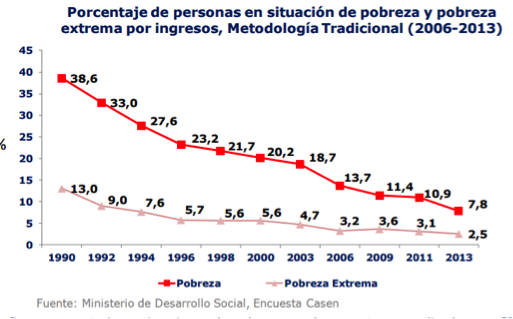
EspañolIn her latest speech on May 21, Chilean President Michelle Bachelet mentioned the word “inequality” a total of 10 times, highlighting this concept as the reason behind the major problems facing the country. While expressing her concern over economic disparities might be well intentioned, her ambition to reduce inequality only harms the Chilean people.
Bachelet’s message and objectives are left in no doubt. “The mandate I was granted is clear: lead the transformation that would allow us to be a less unequal, more united society.” Her administration has unveiled a raft of new proposals and reforms to battle the demon of inequality.
“New proposals have been elaborated starting from a shared perspective: the urgency of putting an end to inequalities and set the cornerstone for a new era of development,” Bachelet said, “because inequality is ethically unacceptable.”
Getting a smaller piece of the pie, provided the pie is larger, could lead to net gains for the less well-off.
The main problem lies in President Bachelet’s belief that inequality is morally wrong. Despite prevailing wisdom about the undesirability of differing levels of wealth, inequality is in fact the engine of progress, and even the entire development of a country. Claiming inequality has grown in Chile is fallacious, and only supported by errors of measurement.
It’s hard to avoid hearing the claim that, as national economies grow, the wealthiest become wealthier at the expense of the poor in an unjust process. But beyond the rhetoric of class war, the reality is that anyone can create wealth, and that even getting a smaller piece of the pie, provided the pie is larger, could lead to net gains for the less well-off.
The Chilean people should actually look at the evidence to see whether the needy have the chance to escape from poverty. In other words, if Chilean society is home to significant upwards social mobility, as Steve Horwitz puts it in the Learn Liberty video above.
The good news is that it Chile has dramatically reduced poverty since 1990, as the following graph from the Casen 2013 poll shows.

This graph shows how poverty continues to fall, debunking the belief that the higher the inequality, the higher the poverty. This points leads us to the second part of this article: has inequality really increased? The answer to this question could be yes or no, depending on the approach taken.
Various studies depicting the evolution of salaries would show that in some cases inequality has grown and in other cases it has been reduced. It’s a mistake, however, to measure inequality based on changes to income alone. The problem is that money is frequently and wrongly equated with wealth.
As Austrian economist Ludwig von Mises insisted, money is simply a means of exchange to facilitate transactions with greater efficiency. But it’s not the amount of money that generates wealth. Given that money aims to be a means of exchange, and money is exchanged for demanded goods and services, then wealth is in the goods, not the money. If all the production of goods around the world were to stop, money would be useless, because people wouldn’t be able to purchase any kind of goods.
A better way to measure inequality is by studying the satisfaction of needs, especially the most basic ones.
A better way to measure inequality is by studying the satisfaction of needs, especially the most basic ones. As the graph shows, a reduction in poverty implies that more people can satisfy their basic needs. And this is what really matters.
Not so long ago, measurements of inequality were hinged on things like access to drinkable water, a privilege reserved for the world’s wealthiest. But these differences are increasingly being erased.
The wages of multimillionaires can be multiplied many times over, but the only difference will be that they can play tennis on a private court, while others would have to rent one. But both can satisfy the same need. From this point of view, inequality has been reduced. We also need to keep in mind that when entrepreneurs are doing well — and earning millions — they benefit society as a whole and not only themselves. Just think of the huge levels of efficiency in personal and business computing created by Bill Gates.
Finally, it’s not inequality that should concern Bachelet. Instead, she should be worried about recreating a suitable environment to recover private-sector confidence, thus promoting investment and tackling what the main goal of her administration should be: poverty reduction.
 Versión Español
Versión Español













